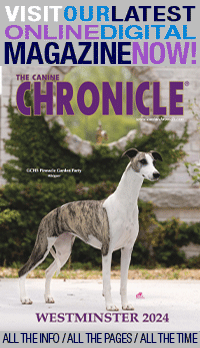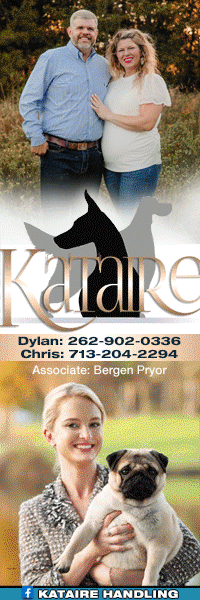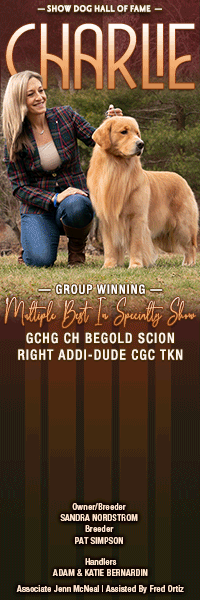The USDA and Our Pursuits

by Lisa Dubé Forman
The United States Department of Agriculture (USDA) is the regulatory agency controlling the commerce of animals. In the upcoming weeks, November and December 2013, the agency will host webinars on the new Animal Welfare Act (AWA) to discuss Retail Pet Store rules and regulations which affects AKC breeders as well. The USDA states that the Animal Care webinars are offered so as breeders may “participate in any or all of these webinars to talk directly with us (USDA) about how this rule may or may not affect our business.”
Previously, a small number of us — approximately 250 people — were able to secure a reservation and attend the September 19, 2013 conference call between the AKC Government Relations Department and the USDA on how the new regulations will affect hobby and commercial breeders. Unsurprisingly, the maximum number of pre-registered attendees for the conference call was quickly reached and the conference exceeded the one hour allotment.
The run-down on how all this came about appears clear enough. According to the Office of the Inspector General (OIG), it performed an audit which found that more than 80 percent of sampled breeders were not licensed under the AWA because they sold pets over the Internet and claimed “retail pet store” status. As a result, the OIG found that these breeders were not being monitored or inspected to ensure their animals’ overall health and humane treatment which led to some buyers receiving unhealthy pets. Simply, the buyer was unable to personally observe the animal before purchasing and/or taking custody of it as they supposedly would do so at a retail pet store. As a result of the revised definitions, the USDA will regulate all dog breeders engaging in sight-unseen sales beginning November 18, 2013.
I may be arguing about semantics, but I resent having the reference and description of a retail pet store applied to my pursuit. The USDA’s preconceived determination and therefore label which they have used to describe myself and nearly all reputable, small-scale hobbyists is both unjustified and a misrepresentation. I take an exception to such characterizations as I have an exclusive program with limited breeding and do not sell puppies to buyers sight-unseen. Nonetheless, the USDA considers myself and all others like me as a ‘Dealer.’
The USDA persists in describing our pursuits as businesses, our avocation as business transactions and describes our proceedings likened to the operations of a retail pet store. Their retail pet store definition is a place of business or residence at which the buyer, seller and the dog available for sale are physically present. The amusing point is that a business transaction is normally associated with a profit. Nearly all reputable, conscientious breeders know this is a farce. We are in the red, not black, all the time. If we are to be considered ‘Dealers’ then we should have the legitimacy and the ability to use our expenses and so-called profits for tax write-offs with the Internal Revenue Service. However, the glitch in this logic, insofar as the IRS is concerned, is that the IRS usually requires a supplementary business to show a profit within a specific timeframe to continue its business status. I know very few who profit from breeding dogs.
The USDA determined that the new AWA will impact only a small number of breeder hobbyists. The revised and strengthened analysis show that an estimated 2600-4600 breeders nationwide meet the requirements of the new Animal Welfare Act for raising and selling of healthy animals. Further, the impact on these breeders operating from their residences will be minimal in the form of licensing, animal identification and record keeping requirements with their projected costs being $284-$550 annually. Of these 2600-4600 nationwide breeders, the USDA determined that a majority would not have to undertake major structural or operational changes to comply with the minimum welfare act standards. Continuing, the USDA recognizes that a small number of breeders will have to make facility and structural improvements to their establishments (residences) but condone these as one-time investments.
I am immediately skeptical of the figures they use and question how they ascertained only 2600-4600 breeders are going to be affected. The USDA reports that “this represents a portion of the breeders we identified through online breeder registries and by assuming that there are some additional dog breeders using remote marketing methods not included in those registries.” I find this answer both nebulous and unhelpful. For representational, valid figures, I venture they would have to access and or establish a comprehensive database. I am curious what online breeder registries they reference. To my knowledge, the AKC may only have something remotely viable but even that is not all-inclusive. The AKC registry reflects a breeder’s annual litter(s) and records active dogs but stops short of being accurate as many breeders do not notify the AKC when they re-home an intact female. This is why I am unconvinced that this number is prototypical of the number of hobbyists who have more than four ‘breeding’ females on their premises. Additionally, I am concerned about the preceding references to facility and structural improvements.
The Animal Care Fact Sheet disseminated by the USDA responds to the possibility that regulated breeders who keep their dogs in their home would be required to house them in a kennel instead. The USDA responds, “Generally not. The AWA regulations define a ‘primary enclosure’ to mean any structure or device used to restrict animals to a limited amount of space — which means that a home can be considered a dog’s primary enclosure. If a room of a house is used as a dog’s primary enclosure (for instance, a whelping room or nursery), AWA regulations and standards apply to that room. However, if a dog breeder allows his or her dogs to have free run of the entire house, we have to determine whether the home can house the animals within AWA standards. If the breeder has a kennel or cages that the dogs can stay in inside the home that meet AWA standards, the breeder has satisfied the primary enclosure requirements.”
Undoubtedly, this is another ‘gray area’ lacking clarity and assuredness. Consider a dog breeder of giant breeds who does not have kennels, rather the dogs are kept in the home. A seasoned, giant breeder usually always keeps multiple intact females for preservation of bloodlines due to shorter life spans, “Murphy’s Law” and making necessary the implementation of Plan B. This regulation may require having giant 54-inch high crates throughout the home to satisfy the revised AWA.
Reducing the Animal Welfare Act to the essentials, here are three basics that will exempt hobbyists from licensing under the welfare act. They can be either one or several of the following: 1. Consummate only face-to-face transfers or transactions (physically present) as the USDA deems this a satisfaction that the puppy or dog has been subjected to public oversight. 2. A hobbyist has four or fewer breeding females. 3. A breeder who breeds dogs that are not sold for use as pets. Summarizing, if you sell a dog or puppy sight-unseen for use as a pet and you have more than four breeding females on your premises, you will have to be licensed under the new AWA.
For clarification on breeding females, the USDA loosely defines it. The default definition is female animals with the capacity to breed are considered ‘breeding females.’ Females that an inspector decides cannot breed due to age, infirmity, illness, or other issues are not considered ‘breeding females.’ Two key words jump out at me, “Inspector decides” which again has repercussions in some breeds. For example, the large or giant breeds are typically not bred after age six, yet an inspector may deem an intact 6.5 or 7 year old female a viable ‘breeding female.’ I am unclear who decides disputes in these cases. If a breeder is actively engaging in breeding and has four or more intact females but only one or a few are being used as breeders, the USDA claims they will look at a breeder’s intent and focus on a breeder’s business activity.
The definition of a dealer is technical. At the retail level, a Dealer is a breeder who sells dogs for research, teaching, testing, experimentation, exhibition or use as a pet. A Dealer on the wholesale level includes a breeder who sells dogs for hunting, security or breeding purposes, but dogs bred for these latter purposes do not come under AWA regulation. The USDA will use every means available to them for enforcement of the AWA. They will act on complaints, they will use public domains with marketing and promotional materials and hope that breeders will self-identify. If there are complaints by the public, these can be anonymous and must be in writing with specificity, and they will send an inspector who will determine the validity of the complaints for the concern of the animals. I believe one or both of these are ripe for abuse.
Retailers and traditional pet stores, in plain speak ‘animal brokers’, are exempt which. in my opinion, is counterintuitive. Under the AWA regulations, a ‘retail pet store’ is a place where only the following animals are sold or offered for sale as pets: dogs, cats, rabbits, guinea pigs, hamsters, gerbils, rats, mice, gophers, chinchillas, domestic ferrets, domestic farm animals, birds, and coldblooded species. Essentially, a ‘brick and mortar’ retailer is exempt from the new AWA as supposedly the Buyer is able to observe and ascertain a puppy’s health and humane treatment. I find this farcical since the majority of us know that a buyer cannot discern a host of health problems, never mind genetic issues. These businesses prey on the emotions of buyers who want to save a puppy from its environment or cannot walk away from its sad eyes. The ongoing irony of this is that these dog and cat retailers, who also collect sales tax, have more influence with the USDA regulatory agency than does the American Kennel Club. In reality, these ‘brick and mortar retailers’ are brokering dogs and cats from wholesale breeding farms, i.e., puppy mills, many of which have flagrant disregard for the care and concern of their animals which suffer endless abuse. The Department of Agriculture (USDA) is responsible for enforcing the Animal Welfare Act, inspecting commercial kennels, uncovering and investigating animal abuse cases, of which it has, by almost all accounts and according to their own audits, performed poorly or in many cases failed miserably. The USDA is incapable of policing the currently licensed and regulated breeding facilities to enforce general standards for humane care and treatment that must be provided for certain animals that are bred for commercial sale, exhibited to the public, used in biomedical research, or transported commercially. The USDA is the regulator to confirm that those licensed facilities must provide their animals with adequate housing, sanitation, nutrition, water, and veterinary care. They must also protect their animals from extreme weather and temperatures. If the USDA were performing their responsibilities, then how is it that horrific dog auctions are able to enjoy unfettered operations?
In closing, it seems that again the compassionate, attentive breeders coined the backbone of our sport, are being held accountable for the actions of irresponsible, high-volume and commercial breeders, many of which register with AKC. Perhaps it is time that we as a group redefine ourselves, our principles and ethics by forming a separate association in an effort to defend our rights and privileges.
Click here to read the complete article from the Canine Chronicle November/December 2013 Issue, Vol. 38 Number 11.
Short URL: https://caninechronicle.com/?p=40533
Comments are closed











